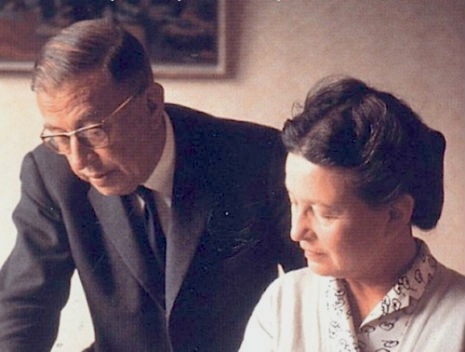
It is difficult to think of Jean-Paul Sartre without thinking of Simone de Beauvoir. They were lovers, comrades, friends whose lives were intrinsically entwined. Each morning they would work separately, then at four o’clock in the afternoon, they would meet and dine at La Palette, continuing their conversation, where it had left off. Then they would return to Sartre’s apartment, where they would work together until evening.
Sartre had moved to a tenth-floor, studio apartment on 222 Boulevardd Raspail in 1962, after the right-wing paramilitary group OAS had twice bombed his previous home on Rue Bonaparte.
It was a modern studio in one of the top floors of a modern building: one big wall full of books, a great leather armchair and a long worktable, thick and old—the kind of table used for meals in a convent—laden with manuscripts. From the table, one could see far into the distance, toward the Eiffel Tower. This new abode was Sartre’s farewell to Saint-Germain-des-Pres, to the postwar period, to the existential explosion—his return to Montparnasse, where, from then on, all those close to him would meet…
In the early 1960s, Sartre’s fame was at its height. He had been famously awarded and then rejected the Nobel Prize for Literature in 1964. He was seen internationally as man of intellect, politics and scandal, yet at the same time, Sartre’s strict adherence to his singular brand of politics and philosophy often made him seem outdated to younger radicals and thinkers.
Even though at the time France was excited over Lévi-Strauss, Barthes, Lacan, Althusser, and Foucault, Sartre refused to confront their fertile methods of investigation in any way whatsoever, let alone with the open mind that would have been useful in such a confrontation.
In an interview with L’Arc, Sartre restated his central beliefs:
“Philosophy represents totalized man’s struggle to recapture the meaning of totalization. No science can replace it, for each science applies itself to a well-delineated aspect of man… Philosophy is the investigation of praxis, and as such an investigation of man… the important thing is not what one does with man, but what he does with what one has done with him. What one has done with man, these are the structures, the signifiers, that the social sciences study. That which he does is history itself… Philosophy is the hinge.”
To the likes of Foucault, Sartre’s emphasis on:
...consciousness, subjectivity, freedom, responsibility and the self, his commitment to Marxist categories and dialectical thinking… his quasi Enlightenment humanism, Sartre seemed to personify everything that structuralists and poststructuralists like Foucault opposed. In effect, the enfant terrible of mid century France had become the “traditionalist” of the following generation.
Sartre was probably aware of this, and his rejection of the Nobel Prize was in part over a fear of being seen as part of the French establishment. This at a time when Sartre was dedicating himself to a biography of Gustave Flaubert, which Sartre (erroneously) believed would eclipse all of his previous work. This only convinced Michel Foucault that Sartre was a man of the 19th century.
Whilst always seeming to be hidden by the shadow of Sartre, it was in fact Simone de Beauvoir who was becoming far more relevant and radical in the 1960s, as her 1949 epoch-changing book The Second Sex was inspiring a generation of feminist writers and thinkers. There is a slight irony that this interview with Sartre and de Beauvoir, recorded for the French television series Dossiers in 1967, should focus so much attention to Sartre, when it was de Beauvoir’s ideas and writings that were more influential at the time. The film does capture the couple’s unique dynamic and discusses Sartre’s rejection of the Nobel Prize, his biography on Flaubert; while de Beauvoir discusses The Second Sex. In French with subtitles.
Previously on Dangerous Minds
Simone de Beauvoir: Why I am a Feminist
Albert Camus vs. Jean-Paul Sartre